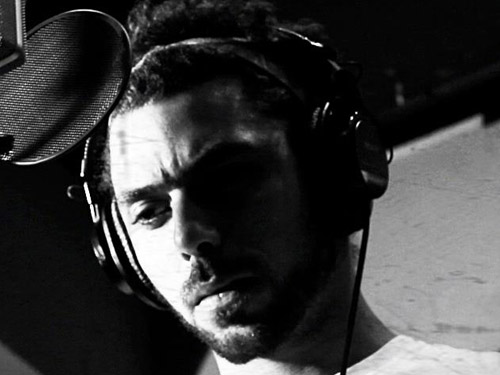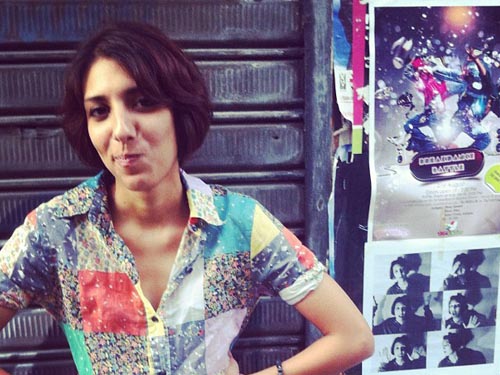“I am not singing,” is the theme singer and songwriter Maryam Saleh gives to her upcoming concert on Friday.
“We essentially relate to things through our emotions. Whether art is philosophical, complex or simple, it is about how sincerely and emotionally it is delivered,” Saleh explains.
This theme has been characteristic of her music over the years.
She describes her work as “contemporary experimental songs” in which an unconventional mix of rock, Oriental, funk and classical music fuse together. With her voice imbued with drama, Saleh dreams to bridge a gap between Oriental melodies and Western arrangements.
Saleh is also an actress – a fact that strikes the listener from the first moment. Screams and sighs characterize a sensual and distinguished performance of the Egyptian crooner, which is further emphasized by her selection of lyrics.
She sings:
Lying is stealing among the crowd and people do nothing / And truth is like alcohol in a bottle that disappears when it is open / And my face is a tragic theater / You, who like tragedy, look fully at my face
Lyrics by poet Mido Zoheir
“What caught my attention was how Saleh’s personality is strongly present in her work,” says Tamer Abu Ghazala, her music producer. “She goes against the rules of contemporary music in the Arab world. She doesn’t give traditional performances, with a soft voice, but , rather, sings with an expressive and striking voice that has high resonance and doesn’t strictly follow the music notes,” he adds.
Saleh started her career so young in a family that values art and culture. Her father, the late Saleh Saad, is a prominent playwright, theater director and critic, who nurtured his child’s passion for drama and music. She joined a children’s choir when she was 8 years old and within a few years started working with her father as an actress and assistant director.
“I grew up seeing Sheikh Imam [composer] and Ahmed Fouad Negm [colloquial poet], who were friends of my father, in our house,” says Saleh. “When I began to sing, I was quite aware of my passion for Imam’s music and songs."
The artist says she tried to engage people beyond Imam’s politicized fan base with a small, Oriental band.
"I was trying to engage mainstream listeners. This didn’t succeed until we began mixing his Egyptian style with rock instruments like a lead guitar, bass guitar, drums and keyboards, attracting youth attuned to different music genres,” she adds.
With this philosophy, Baraka was formed in 2008, and was received with much excitement by young audience members.
“It was during that period that I started composing melodies for my own songs. I composed six original songs and it was amazing,” says Saleh. “In time, I felt a strong urge to experiment with my own music. Singing for Sheikh Imam no longer reflected the things I was experiencing; he had his own views and accounts on what happened back in the 1970s. I wanted to express the present with my own language.”
From this period, Saleh proudly cites a song:
You, who adore the tree, go climb it / Before the berry season ends / The world is beautiful within its battles / A desire evolves and a desire perishes / And people lost in their despair / Upside down and upright
“I can see Saleh reflecting on her position in society in the last few years from socio-political angles, and she is questioning her references and actions in every phase of her life,” says Abu Ghazala.
Saleh speaks about her plans with much enthusiasm.
“Now, I am working on branding my name in a new project with Ekaa Productions. I’m not only doing rock music; the formation is still malleable and my music producer Tamer Abu Ghazala is helping me develop my style. I am trying more to make my own music and present less covers; I don’t have to sing oldies so that people like me better.”
Saleh sees her cooperation with Ekaa as flexible.
“The music I am currently working on reflects a lot of political cynicism. Next year, maybe I am going to work on totally different ideas and lyrics, another music style all together, depending on the moods and the moment."
Like many young artists presenting non-commercial songs with a political spin, Saleh has not garnered a lot of media attention. Yet, she foresees positive change with the ongoing uprising.
“Media, particularly state-run, is deliberately contributing to distorting the taste of audiences. Underground musicians now need to cooperate and create some kind of platform to promote their work.”
Abu Ghazala is optimistic that his client can succeed in today's market.
“We have better chances now. Last February, people at Tahrir Square embraced voices of young, unknown artists who chanted for freedom and justice with passion and authenticity. Media is presenting new faces and concerts are more frequent. However, I believe that we need to look for more perfection and seek quality before fame; this is the basis for real accomplishments.”
Saleh is performing on Friday, 12 August as part of the Hay festival at Genaina Theatre, Al-Azhar Park at 9:30 pm.




